
The further adventures of Takeshi Nanjo, the Young Boss.

Minosuke
After a yakuza boss is assassinated by a rival, his naval officer son returns home to take over the gang.

A musical romance.

Organized thieves battle against the Shogun’s ruthless ruling in attempt to get back their land.
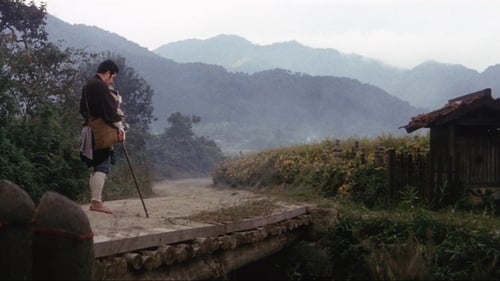
Waheiji, leader of the chasers
Blind swordsman/masseuse Zatoichi befriends a young woman returning home with her baby. When gangsters mistake her for Zatoichi and kill her, Zatoichi determines to escort the baby to its father. He gains the reluctant help of a young pick pocket and together they travel to find the baby's father. But they do not reckon on the father's reaction to their arrival, nor on their own growing feelings for the child.

Kudo
A man operates a small real estate business near Osaka. A man from Tokyo asks for help in buying a large tract of land in order, he says, to build an automobile factory. But by accident the realtor learns that the Tokaido Railway Line is going to be built directly across the land just acquired.

Industrial espionage gets in the way of love and marriage for factory worker Katayanagi.
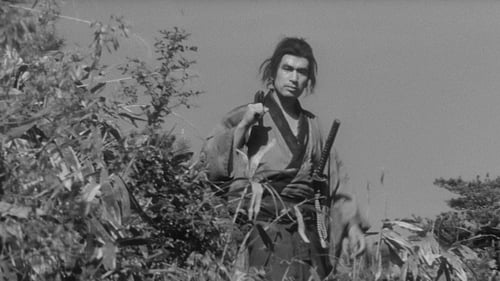
Uzaemon Matsushita
Shiba, a wandering ronin, encounters a band of peasants who have kidnapped the daughter of their dictatorial magistrate, in hopes of coercing from him a reduction in taxes. Shiba takes up their fight, joined by two renegades from the magistrate's guard, Sakura and Kikyo. The three outlaws find themselves in a battle to the death.

Picked up and raised on an island in the Seto Inland Sea, Yasukichi's only trait is his innate mischievousness. However, because his love for his hometown is exceptionally stronger than anybody's, he is trying everything he can to somehow help the inhabitants of the island which are going through a recession. He saddles himself with a debt to bring a cheap band onto the island and tries to market the underwater sightseeing ship on the island without regards for the Marine Act.
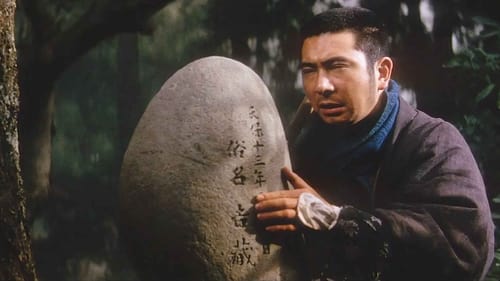
Enzo
Ichi travels to the village of Itakura to pay his respects at the grave of Kichizo, a man he killed two years ago. When some tax money is stolen while in transit to the governor he is accused and sets out to find the money and clear his name.

Масато из рода Такэути
Yoso is truly a lost classic, set in the Nara Era (710-794), from Kinugasa Teinosuke the same writer/director who gave us the recognized classic Gate of Hell (Jigokumon, 1952) & the milestone silent surrealist masterpiece A Page of Madness (Kurutta Ippeji, 1926).

Kinbei Kanamori
A Tokyo family escaping the war relocates to a Hokkaido village; their daughter is set to marry the local leader's son, but her siblings disapprove.
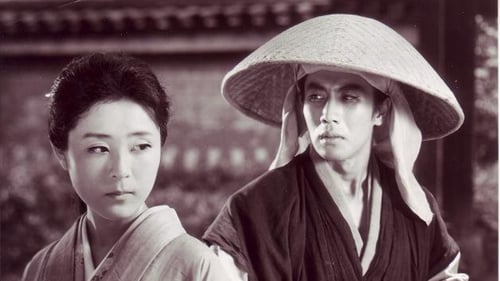
[Period covered: 1582-1594]. As the film opens, the warlod Nobunaga Oda rides to Iga Ayanokuni shrine. He is asked if he thinks he has destroyed all the ninja who opposed him and answers that he suspects that there may be more. A servant brings water and tests it first. The paige dies and we hear gunshots as two ninja flee the scene. His suspicions confirmed, Nobunaga oversees the execution of captured ninja and decides that, in the future, he needs a much crueler method of execution. The daimyo Hideyoshi comes to visit.
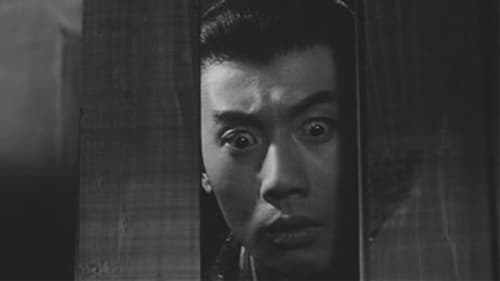
In the mountain regions of Hida, the dreams of a peasant named Kyonosuke, who longed to be a samurai, come true when he becomes one of three doubles, of shadows, of Lord Yasutaka. After months of intense and cruel training, he faces his destiny when the Lord and the other two shadows are killed in battle and he must take on the role of Lord Yasutaka....
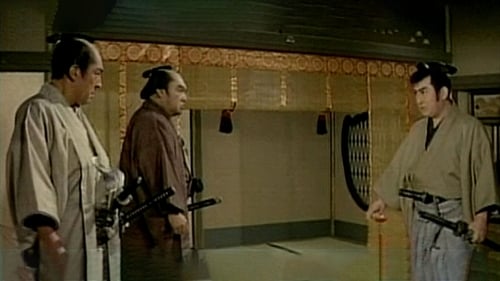
When a group of men from the Hanya clan search his town for a missing geisha, a brave ronin decides to help her and a drunken calligrapher. In doing so, he uncovers a wider scheme.
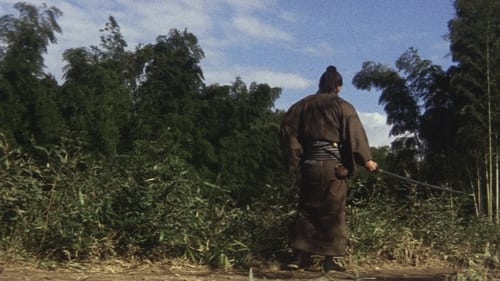
Teizô Miyabe
As winds of change sweep Japan, an honest man joins the Shinsenhumi out of admiration for its leader and because he wants to live and die as a samurai. However, as his involvement grows, reality and idealism come into deadly conflict.
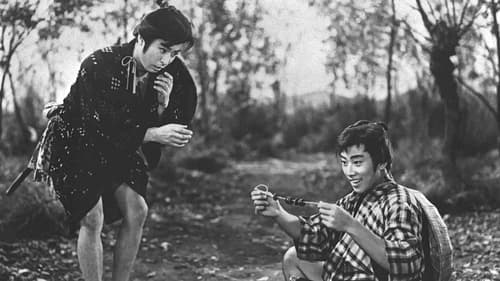
A wandering vagrant, Hantaro, risks his life to save a beautiful blind girl and her father from con artists.
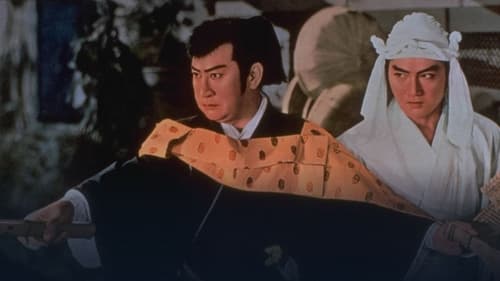
Suruganokami Daidôji
The story concerns the efforts of seven master swordsman who join together to protect the new inexperienced Shogun Tokugawa Yoshimune from the evil plans of the Owari Clan's corrupt Lord. It's a colorful bunch, a drunk samurai, a master thief, a sword instructor and a Lord who is disguised as a ronin since it is an executable offense for a lord to wander outside of their domain without permission. As the Chief Magistrate becomes suspicious of the Owari plot to send men to Kodenmacho Prison to start a riot he begins to investigate the rumors. He soon calls upon the Lord of Mikazuki Castle and the Shogun's best friend to help thwart the evil ambitions and battle the rouge swordsman hired by the Owari Clan.

Chuji and his family become the primary target of gangs in Nikko headed by Hasshu marshal Nakayama and boss Sukegoro Iioka. Chuji is then aided by boss Shigezo Sasagawa, Ishimatsu, and a few young yakuza.

Adaptação de um romance escrito por Kyouka Izumi. Conta a história do amor impossível entre um estudioso e uma gueixa no final do século XIX.

A geisha helps a runaway who looks just like her.

1962 Japanese movie

Godo Ishiyama
1961 Toei adaptation of Yokomizo's novel.

Japanese comedy film.

Daiei Film Company's three biggest stars shine in this exciting story about Vice-Shogun Mito Komon's journey to the land of the Ainu. As the shogun's uncle, Lord Mito traveled about the nation seeking to make sure that corruption and injustice did not go unpunished. Traveling together with his two faithful bodyguards Kaku and Suke, they board ship for a voyage to the far northern island of Ezo (modern day Hokkaido) where the indigenous people called "Ainu" live. Somewhat like American Indians, the Ainu had their own culture which had not been subjugated by the Matsumae clan, rulers of the vast island. A revolt is brewing within the leadership of the Ainu, which threatens to destroy their peaceful lives. The elder lord and his retinue are the only ones who can stop this reign of terror!

President Kazama
Japanese "kayo" film based on the song by Tsuzuko Sugawara.

The story of Sasaki Kojiro, a young swordsman, and his quest to train under master Seigen and develop his own style.

Arima
Japanese comedy film.
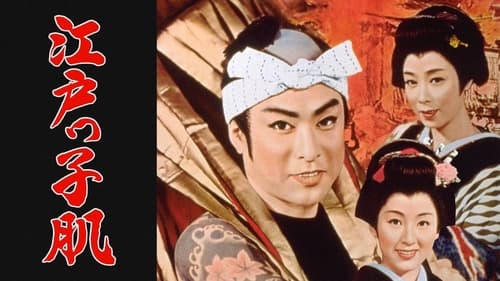
Action and adventure abound in this story of friendship between two rival firefighters, Kichigoro and Jirokichi in old Japan. When Mukai Sadayu, the vassal of Kaga Clan's accounting officer, Shinagawa Daihachi demands that Omon serve him tea in his mansion and she refuses, the clan's samurai abduct her setting in motion a series of events that will bring the two firefighters into a world of danger and excitement. Jirokichi, leader of the Edo firefighting team "Ha-gumi" must first rescue Omon from the clutches of the vile Kaga Clan's retainers.
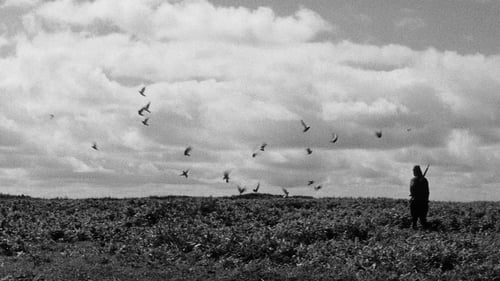
Dôkutsu Taichô
Nesta parte final da trilogia, Kaji é o único sobrevivente de sua unidade e acaba se rendendo ao exército Soviético. Ele é preso na Sibéria, onde espera melhor tratamento do que recebeu de seu próprio exército, mas, ao contrário, é acusado de assassinato e ameaçado de execução. Kaji tenta, desesperadamente, recuperar sua liberdade.
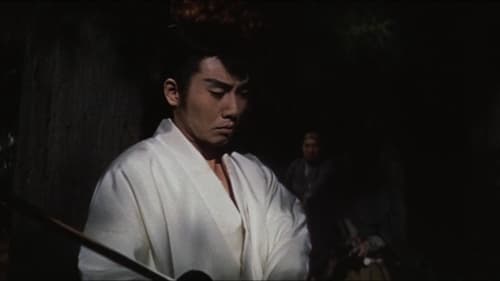
The sequel to Daibosatsu tôge (1960) and the second of the trilogy follows the adventures of Ryunosuke Tsukue after he is blinded.

The exciting story of Jirocho and his yakuza gang that controlled the area of the Tokaido during the latter days of the samurai era. Awesome fighting from Katsu Shintaro as One-Eyed Ishimatsu highlights this great tale taken from Japanese history!

First "Pfc. Story" sequel and eighth overall sequel to "Story of Second Class Private".

Okuda Awa-no-kami
Kinnosuke of Toyama sets out on a private mission to clear his father’s name for a crime he did not commit.
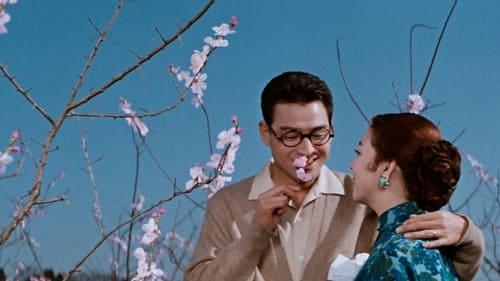
Furuya
Pu Zhe , the younger brother of the Emperor of Manchukuo, Pu Wen, marries Ryuko the daughter of a long-established aristocratic family - all in the interest of the Japanese rulers , which legitimizes the relationship between Japan and its Chinese puppet state. To the surprise of all , a deep love between Pu Zhe and Ryuko develops. It is put to the test when Japan loses the war, Manchukuo is dissolved and the imperial court must flee. The lovers now have to separate: Pu Zhe tries to escape to Japan with his brother , while Ryuko flees with her daughter Eisei over the country. A film on the relationship between Pujie (1907-94) , brother of the " last emperor " Puyi and his second wife, Marquise Hiro Saga (1914-87).

Filipinas, 1945. O Exército Imperial Japones foi reduzido a um bando de maltrapilhos escondidos nas florestas. Entre eles está o soldado Tamura. A situação vai de ruim a péssima e face as condições extremas que os homens enfrentam, alguns enlouquecem e outros sobrevivem através do assassínio e canibalismo. Em meio a isso tudo, o soldado Tamura tenta sobreviver sem abandonar os seus princípios.

Lieutenant Fujikawa
First installment of the "Pfc. Story" series of military-themed comedies from Shochiku, and seventh overall sequel to "Story of Second Class Private".

Yagyu Munenori
Yagyu Jubei proves his skills in this early adventure film.

Hayato

Staff Officer Kuranishi
Sixth sequel to "Story of Second Class Private".

Shochiku's commemorative 3000th film production; a suspenseful period drama.

Fourth sequel to "Story of Second Class Private".

Film directed by Tadashi Ashihara
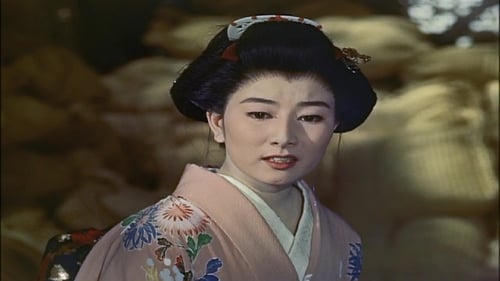
From the pen of Yoshikawa Eiji comes this exciting story. The Naruto Strait separates Tokushima from the islands of Awaji and Honshu. On Tokushima the mad lord dreams of conquest and forges a bloody revolt against the Tokugawa shogunate. A mysterious swordsman named Noriyuki Gennojo has crossed Naruto’s waters to uncover the Awa clan’s secrets. He puts his life on the line after finding a testament of Awa’s secrets, written in blood by a dying man. Joining Noriyuki are a female ninja who loves him, and the beautiful daughter of an enemy who’s sworn to kill him. Awa’s defenders willl stop at nothing to prevent the blood-soaked letter from reaching the shogun.

Period drama based on the novel by Saisei Murō.

Based on the famous novel by Yamagami Itaro, this is the story of a group of ronin living in abject poverty in the latter days of the Edo period. Starring the great Konoe Jushiro, Ronin Gai is populated by an ensemble of colorful characters, social outcasts who patronize a restaurant and bar on the outskirts of Edo. Among them are masterless samurai reduced to drunkenness and debauchery. One disgraced and disillusioned former warrior gets a chance at redemption when he is hired to retrieve a famous knife from a corrupt lord. This is the third version directed by Makino Masahiro and is considered a true classic.
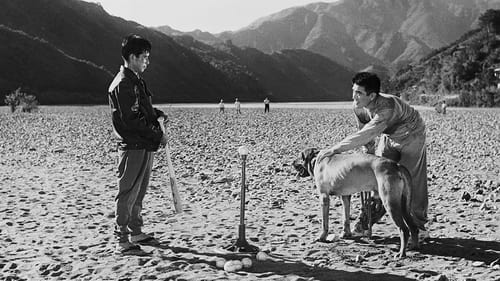
Tadasuke Rokkô
A talent scout moves sharply, dead-set on signing a promising athlete to the baseball team the Toyko Flowers.

Senior Managing Director Takano
A botanist woos the secretary of an industrialist whose company threatens the local water supply.

This period film is inspired by one of the most notorious scandals to have taken place in Edo-period Japan. The heroine, Ejima, was a lady of the Ooku, the harem of Edo Castle in which the Shogun’s mother, wife and concubines resided, forbidden from contact with any other man except in the presence of the Shogun. The institution played a key role in the Byzantine world of Japanese court politics during the Edo era. In 1714, Lady Ejima was sent to pay her respects at a Buddhist temple in the city, and chose to pay an unauthorised visit to the kabuki theatre – a violation of protocol that was to have tragic consequences.

Private Detective Ippei Shizuno faces off against a serial killer and a wealthy woman's society who runs an illegal gun trade.

Fujiwara no Tokinobu
Special Forces commander Captain Tadamori returns to Kyoto after successfully defeating the uprising of pirates in the western sea of Japan. But because the high courtiers dislike career soldiers gaining power and influence, they ignore the will of ex-Emperor Toba and refuse to reward the captain. Reward recommender Lord Tokinobu is punished, and the captain sends his son Kiyomori to the Lord's residence, where he falls in love with Tokiko, the Lord's daughter. Meanwhile, Kiyomori finds out that he is possibly the ex-Emperor's son... Written by L.H. Wong
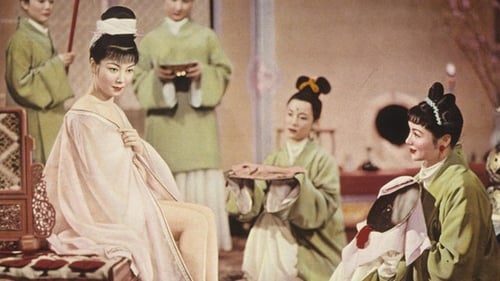
Li Lin-fu
China, século XVIII. O último Imperador da dinastia T’ang faz o luto pela morte da mulher. A família Yang quer arranjar-lhe uma nova consorte, assim consolidando a influência na corte. O general Na Lushan encontra uma parente afastada a trabalhar na cozinha, a quem é proposto ser apresentada ao Imperador, recriando a imagem da primeira mulher dele. O Imperador apaixona-se por ela, entretanto instruída e ornamentada para ser sua concubina, e ela torna-se a Princesa Yang Kwei-Fei.
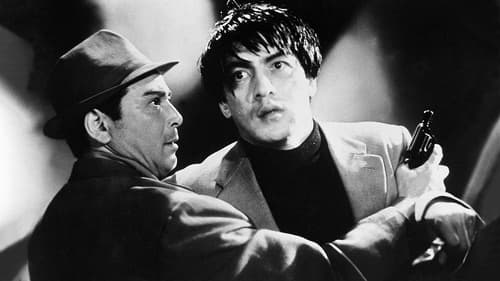
Kitagawa, a drug control officer in the Kanto Shinetsu area, was ordered to investigate the situation of drug trafficking around Yokohama.
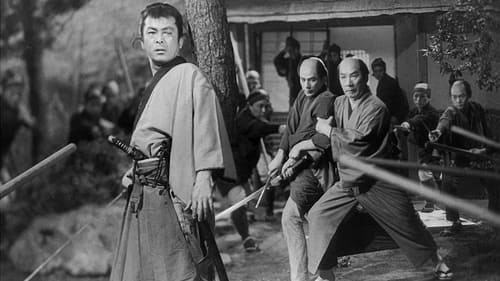
In this movie, Sashichi tries to catch a serial killer who kills his victims with shurikens.

Yasuichiro Isa, who works in the labor section of Sone Mining Tokyo Headquarters, paid a monthly fee for his younger brother, Reiji, who was in trouble because he had a bonus of 10,000 yen more.
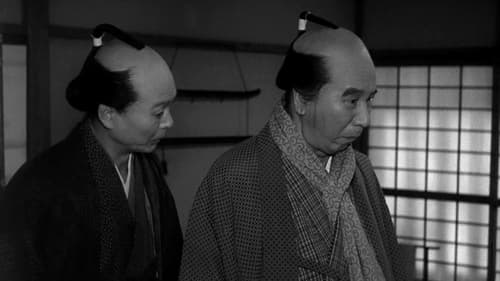
Isan
No século XVII, esposa de um rico avarento vive insatisfeita e frustrada, e quando precisa de dinheiro para ajudar o irmão, recorre a um dos empregados do marido. Os dois são descobertos, mas o rapaz assume a culpa para salvá-la. Sabendo das traições do marido, ela decide arriscar tudo e fugir com o empregado.

Shigeki Kachi, Tosuke Satomura, and Nanako, who belong to the theater company Vuanbert around Dosa, withdrew at the indignation of the chairman Hayashi and seeked their own careers in the film industry.
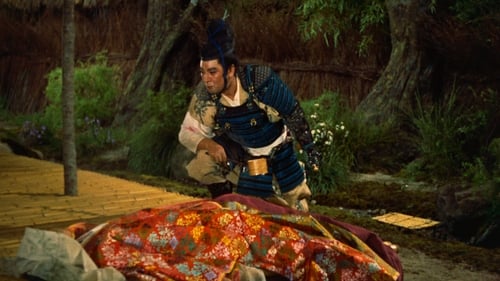
Yachūta
Em 1159, durante uma tentativa de golpe contra a realeza, arma-se um plano para que a família real possa fugir. Uma senhora da corte aproveita a situação e se faz passar de esposa de um Lorde para sair da cidade. Ela conta com a ajuda de um samurai, que a escolta com segurança. Mais tarde, o samurai pede ao Lorde como recompensa a mão desta mulher em casamento. Mas ele descobre que ela já é casada. O samurai não irá desistir e chegará a desafiar o marido de sua amada para que a deixe, o que irá gerar trágicas consequências.

Japanese war drama.
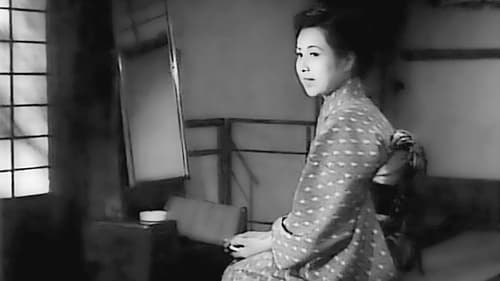
Ten years into a marriage, the wife is disappointed by the husband's lack of financial success, meaning she has to work and can't treat herself and the husband finds the wife slovenly and mean-spirited: she neither cooks not cleans particularly well and is generally disagreeable. In turn, he alternately ignores her and treats her as a servant. Neither is particularly happy, not helped by their unsatisfactory lodgers. The husband is easily seduced by an ex-colleague, a widow with a small child who needs some security, and considers leaving his wife.

Dedication of the Great Buddha is a 1952 Japanese film directed by Teinosuke Kinugasa. It was entered into the 1953 Cannes Film Festival.

Western-style Painter
Thriller drama by Kon Ichikawa

A Japanese adaptation of Guy de Maupassant's short story Boule de Suif, directed by Kimura Keigo
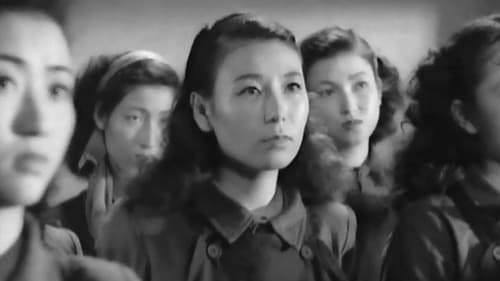
The critical establishment was clearly not prepared to accept a woman's prison film featuring former prostitutes recovering from venereal diseases, unwanted pregnancies, and estranged lovers. With its cat fights, hysterical tantrums, film noir lighting, and dramatic music, White Beast is indicative of the new influences of the Hollywood psychological thriller on Naruse. Caged (John Cromwell, 1950) initiated a cycle of women's prison movies in the United States that may or may not have been shown in Japan, but the stylistics of White Beast draw on the same paranoid woman's films and film noir conventions that preceded the American cycle.

Directed by Eisuke Takizawa

Jida-geki by Santaro Marune.
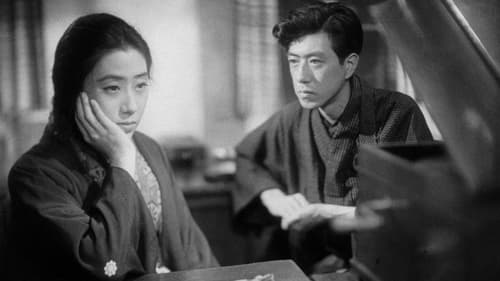
Yozo Hirai
Sumako, a country girl, becomes a great actress with the help of Hogetsu,a scholar who brought some of European realism to the Japan's stage. The relationship leads to the end of his marriage and the breakup of his Arts Society. This is another version of Kenji Mizoguchi's film "The Love of Sumako the Actress" ("Joyû Sumako no koi"), from the same year. Both tells the story of the famous actress Sumako Mitsui (1886-1919), considered the first great modern theater actress in Japan. Mizoguchi himself is said to have preferred Kinugasa's version.

Shûji Hirobe
Slice of life film centered around a couple of years in the life of a rural high school girl.

Based on the comic by Kaoru Akiyoshi

Kuranosuke Nakamuta
During the Taiping Rebellion of the mid-19th century, anti-Qing (Manchu) Chinese forces led by Taiping commander Li Xiucheng march on Shanghai. Although the Western powers are officially neutral, the British consul in Shanghai sides with the Qing imperial government, and counter to his own government's policy he retains American adventurer Frederick Townsend Ward to raise a mercenary force of foreigners in Shanghai and oppose the Taipings. Ward's force is routed, with heavy casualties, but since many of the casualties are British, the British army soon is drawn in on the side of the Qings. The only support for the Chinese comes from Japanese in Shanghai and anti-imperialist demonstrations in Japan. A family drama plays out against this historical background. After a Chinese home is destroyed by careless British shelling, killing the father and crippling a daughter, the surviving son vows revenge but begins to see that his true friends may be the Japanese.

Minowada, a young teacher at a National People's School, has his own theory of education and the daughter of his linguistics teacher becomes drawn to him. Kayo, a strong-willed doctor, is also attracted to him. A mediator tries to arrange a marriage but just at that point Minowada receives military call-up papers.

Hachiemon Shibasawa
This epic depicts the battle between Uesugi Kenshin and Takeda Shingen. The focus of the story is the struggle by the unit leader in charge of the main supply wagons and the supply troops to transport materiel to the Uesugi army. To this are added episodes involving an itinerant woman.














































